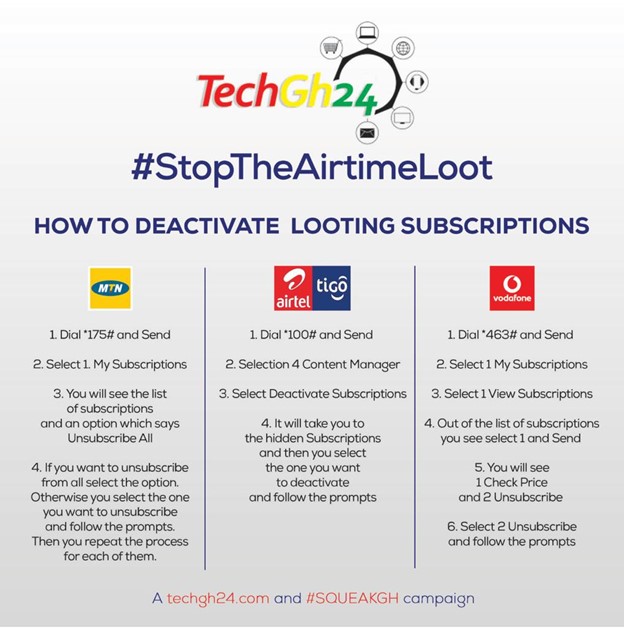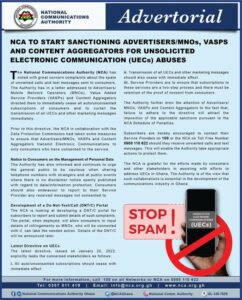Campaign to #StopTheAirtimeLoot makes impact
 There is no doubt about the fact that the #StopTheAirtimeLoot campaign started by Techgh24 and #SqueakGh about six months ago, has been one of the most impactful public education and consumer protection campaign in Ghana in recent times.
There is no doubt about the fact that the #StopTheAirtimeLoot campaign started by Techgh24 and #SqueakGh about six months ago, has been one of the most impactful public education and consumer protection campaign in Ghana in recent times.
The relevance of the campaign was hinged on the FACT that there is proven evidence that telecom operators in the country and their cohorts in the supposed value-added service (VAS) space had turned an otherwise innovative arrangement to deliver value to consumers, into an airtime looting scheme on the blind side of consumers. Simply exposing the loot and educating Ghanaians on how to block it, made this campaign a success.
We want to believe that the telcos, as corporate institutions, are not practically participating in the loot, but it is obvious there are people inside the telcos who are in on it and the telcos are reneging on their responsibility to protect their subscribers from their loot, as by law required. Section 31 of the Unsolicited Electronic Communications Code of Conduct places that responsibility on the telcos and no one else.
Again, the telcos are the biggest financial beneficiaries from the loot (60 to 70%), so, they can’t have the luxury of sleeping on the job while their subscribers get robbed.
The campaign has chalked some very significant gains, but the fight is still on because, to the extent that no one has been sanctioned yet, the airtime looters are still taking their chances and engaging in signing people on to looting schemes without due process. But we are at a stage where we now report the individual cases as and when we pick them up. A number of reports have been filed to the National Communications Authorities and other appropriate regulatory bodies, pending investigations and the necessary actions.
Impact so far
So far there have been some very significant milestones in the campaign that are worthy of note:
The various campaign flyers put out by Techgh24 and SqueakGh went viral on all mainstream and social media platforms and took a life of their own to the extent that several Ghanaians started to follow the steps provided to check out of looting subscriptions that they had no clue had been put on their phones without their consent.
We have been hosted on several national media platforms like GTV (three times), Joy News, Adom FM, Adom TV, Nhyira FM, Uniiq FM and Angel FM to educate the public on the loot. Indeed, during phone-in sections, several people confirmed finding hidden subscriptions on their phones and were assisted to deactivate them.
Based on the campaign, loads of Ghanaians have now made it a habit to use the respective short codes highlighted by the campaign to regularly check for any hidden subscriptions on their phones and deactivate them. The short codes are *175# – MTN; *463# – Vodafone; and *100# – AirtelTigo.
The National Communications Authority has issued clear directives on the matter, warning the perpetrators that they risk being sanctioned if they don’t stop signing people on without their consent, as the law requires.
National Communications Authority has also collaborated with the Data Protection Commission to ensure that the electronic data of subscribers are protected in a manner that ensures that no one subscribes them to any service without their consent.
The telecom industry players themselves, led by the Ghana Chamber of Telecommunications, have started taking steps to constitute good governance and public education committees to ensure that they clean up their act in the supposed VAS space and also educate the public on how to prevent the airtime loot (something that the campaign is already doing).
Since the campaign started, telcos have also now started sending verification messages seeking our consent before signing us on to any paid subscriptions. Hitherto, they just signed people on without seeking and or verifying their consent as the law requires. But now some of them do so, and it allows people to either Accept or Reject.
How did we get here?:
In August 2021, I personally found out that my MTN TurboNet Data SIM had been signed on to an SMS Weather Report Service on short code 540 without my consent. It was easy to conclude that this was a loot for a number of reasons:
The TurboNet SIM is a data SIM and not a regular voice call SIM.
The TurboNet SIM has always been inside the TurboNet and never been taken out and put in any phone.
The TurboNet SIM had never been used to send a any SMS, much less subscribe to an SMS service.
The TurboNet SIM number was only known by myself and my service provider, so it was obvious that my service provider knew something about the looting subscription on my TurboNet SIM but I had no clue until I noticed some airtime had been stolen from my SIM.
So, I confronted the service provider, MTN, and they pointed fingers at a third-party VAS partner called IGNITIA, which is what they often when they are caught stealing from us. When I contacted Ignitia, they told me that they had no control over signing on any subscriber until MTN sends them the contact of that subscriber to sign them on. In other words, MTN was the only entity who could authorize their third party VAS providers to sign us on to any subscriptions. And Ignitia was right, because that is what the law says – it place the responsibility entirely on the telcos.
This single incident, to a large extent, confirms the suspicion that there are people on the inside of telecom companies who connive with the VAS providers to in a grand airtime loot scheme, so they can share the loot. The telecom companies, as corporate entities, may not be in on it, but there are definitely insiders who are engaged in this grand create-loot and share scheme.
That incident, plus the fact that my own mother was signed on to another looting subscription called VUCLIP GAMES and was charged as high as GHS2.02 a day until she lost over GHS40, and the widespread complaints of airtime vanishing from people’s phones, made me decide to go on a campaign with very clear objectives:
To confirm if indeed this loot was widespread
- To expose the loot
- To provide Ghanaians with the knowledge/tools to deactivate any looting subscriptions
- To get the regulator(s) to investigate the emerging issues and crack the whip where necessary, and
- To get the industry players to clean their act and sanitize the VAS space.
So far, as stated above, the loot has been confirmed and exposed and to a large extent, through the sharing of flyers that provided the short codes for people to check; Ghanaians now know what to do to find and deactivate looting subscriptions, and the regulators have also taken the necessary step to protect the public. Indeed, specific reported cases are being investigated and the industry players themselves have also given indication that they are taking steps to clean up the system and ensure some sanity.
Way forward
It has been six months of vigorously campaign against a grand loot on Ghanaians, which run into hundreds of millions of Ghana cedis in conservative estimates annually, all going into the pockets of some “thieves” who pretend to be providing value-added services to Ghanaians.
We look forward to some of these looters being sanctioned according to law. Once that happens, there could possibly be a subsequent class action by people who believe they deserve to have their stolen airtime back.
As stated in point six above, we have noticed that since the campaign started, the telcos now send verification messages to our phones in a bid to confirm our consent. But even that two-step verification process is being abused  because those confirmation messages are supposed to be sent to only people who have made requests. But in many cases, they send such messages to people who have not made any requests.
because those confirmation messages are supposed to be sent to only people who have made requests. But in many cases, they send such messages to people who have not made any requests.
In one case currently being investigated by NCA, an MTN Customer Service Staff actually lied about the source of the request and subscription. He actually named a third party who had nothing to do with that service. Again, that is possible proof that there are people inside the telcos who are in on this grand loot and would cook up any lies and sell to subscribers.
What we therefore expect the NCA to do is to insist on telcos sending their verification messages in the form of regular SMS instead of just as pop-up messages, so that both subscriber and service provider can keep copies for future reference.
We have also made a number of proposals to the NCA in an Open Letter to the Board Chairman, which we believe will help protect subscribers better.
The charge is clear – we will not stop until the loot stops completely, even if it has to take at least one looter being identified and sanctioned to deter others.
Samuel Dowuona
